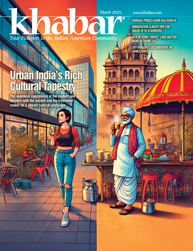Talk Time: Child's Play

(Photo: Cameron Bertuzzi)
Struggling to find culturally appropriate toys and books for her kids, Rupa Parekh decided to leverage her Wharton MBA and entrepreneurial spirit to launch Umani (named for her children, Uma and Nico). She hopes to reach multicultural families who—like Parekh and her Turkish husband—are looking to share their culture and mythology with the younger generation.
What was the motivation for you to start Umani?
As an Indian-American, for a long time, I would
feel like I had to call my mom whenever I needed
help with things like cooking a dish or covering the
significance of a holiday. I always wondered, ‘How can
I bottle up my mom when it comes to knowing things
about our culture?’ Then I married a Turkish-American.
That added a new dimension, where we now are part
of a blended family. Now all of a sudden we have this
opportunity to be teachers, where up till now we felt
like students. In order to be a good teacher, you need
tools, and I didn't feel like I could find the right ones.
Even multicultural ones are not designed well. My parents would bring things from India but even the books were not child friendly. They couldn't compare to The Very Hungry Caterpillar or other simple, memorable stories. By the time I had my second child I realized that this problem wasn't solved.
The first line I launched is called Jai Jai Hooray, which starts with my heritage and what I know, but the larger vision that was also born is about more global play for global kids, because I think this problem is a human problem. We all want to pass on traditions.
How do you make something complex like
mythology accessible to children and preserve the
essence of it?
I was nervous because with culture, especially
in a place like the Indian subcontinent, the practices
are so different region to region, and then you layer in
something like mythology and people feel very precious
about it. And then you start to offend people.

(Photo: Ana Gambuto)
When I had kids, I realized that you're so anxious, excited, and frankly desperate to pass on anything, that I do believe that you let go of pedagogy a little bit. The whole philosophy of our company is that it's about modernizing traditions, and it's about keeping them fresh and more inclusive and exciting.
We also want to keep things simple enough. Now my American mother-in-law can help the kids learn who these characters are through the flashcards we design. That's a big philosophy—to design things simply and beautifully in a way where anyone can be a teacher or a student.
We're really starting to think about what is culture and what gets handed down. It’s about folklore, food, dance, and celebration. And when you have tools to integrate them into everyday life, it becomes really fun. You can play with our Holi powder on a Saturday and make that tradition a lot more fun and accessible to everybody. We built a vocabulary for the goddesses. How do you describe Lakshmi? She's my good luck charm. How do you describe Parvati? She is the sun and moon of our family.
What has the response been like?
We get love letters every day. We have thousands
of fans worldwide. The Brooklyn Children's Museum
invited us to plan their Holi festival. It was amazing,
and that has actually excited our fans and they want to
see more live experiences.
What’s next for you?
We want to make the experience of learning about
culture something that is fun for parents and for kids.
We're really interested in creating opportunities for
families to explore their identity through play. We do
want to help parents start dialog with their kids at all
different age levels, even by starting with the basics.
We've got lots of ideas about other aspects of culture because we're not just about religion—it's where we started.

Poornima Apte is a Boston-area freelance writer and editor. Learn more at WordCumulus.WordPress.com.
Enjoyed reading Khabar magazine? Subscribe to Khabar and get a full digital copy of this Indian-American community magazine.
blog comments powered by Disqus











